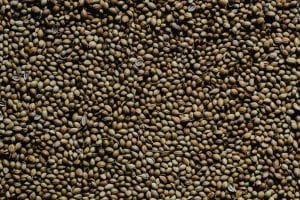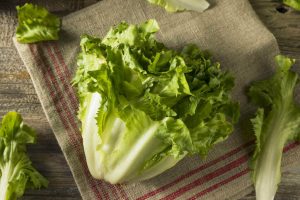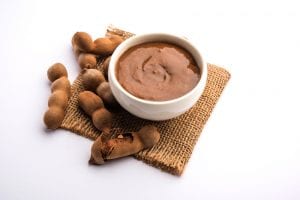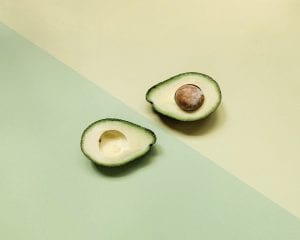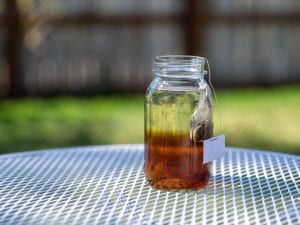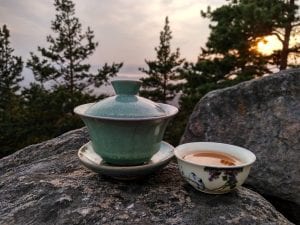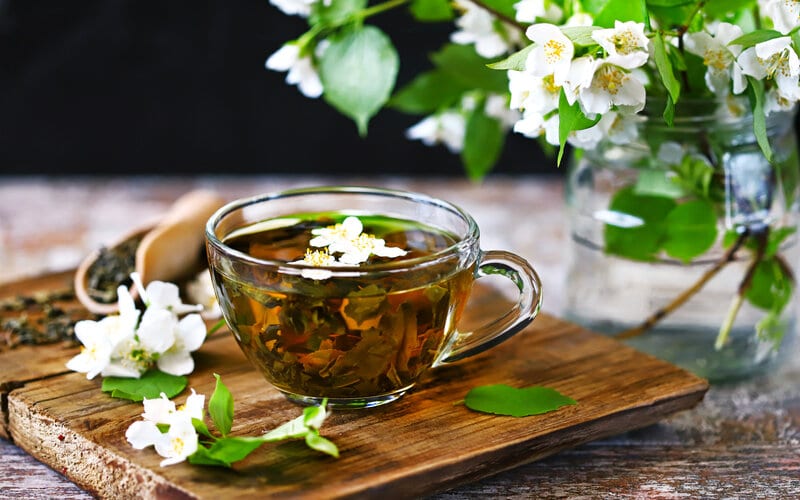
Whether it’s brewed hot or served iced, jasmine tea is the perfect drink of choice to have at any time of the year. Lightly scented with fresh jasmine blossoms, this fragrant and soothing drink has been an all-time favorite around the world.
In this article, we’ll show you why jasmine tea is one of the favorites in the world of scented teas. You’ll discover the fascinating origins of this posh drink, its health benefits, uses, and more.
This delightfully sweet drink has a lot to offer! And we’re sure that it’ll soon become one of your favorite beverages, if it isn’t already. Flowering teas, like jasmine and blooming tea, are among the most popular types to drink. Try this easy flowering tea recipe and see why! We’ll also show how you can make a cup of sweet jasmine tea for yourself. So, continue reading if you want a soothing taste of this freshly brewed beverage.
What Is Jasmine Tea?
Jasmine tea is a sweet-scented type of tea made from true tea leaves and jasmine flowers. The combination of leaves from the Camellia sinensis plant (where tea leaves come from) and jasmine flower petals give this tea a flowery flavor and fragrance. Several types of Chinese teas, like green tea and black tea, are commonly made from the leaves of Camellia sinensis plants that are endemic to East Asia.
The flower petals used to scent this tea can come from two varieties: Common Jasmine and Arabian Jasmine. Each has its own distinct fragrance and flavor profiles. Common jasmine has a sweet, mild scent, while Arabian jasmine has a bright, citric, and sparkly flavor. But this perfumed tea isn’t only famous for its signature floral aroma. It also boasts significant health benefits.
The flowery flavors of jasmine tea were born during the Ming Dynasty, a time when there was deep fascination with floral designs, smell, and flavor. Later on, flower-scented beverages became a trend. The art of scented teas was only widespread in China for a couple of centuries. However, this scented beverage was able to make its way to the Western world during the 19th century. Since then, it has grown popular worldwide. And until today, people are still awed with its delicate taste and aromatic scent.
Now, if you’re looking for an equally invigorating drink amidst your busy schedule, check out some of our best tea recipes. They’re equally refreshing and healthy as well. Sip on and soothe your worries away!
What is Jasmine Tea Good For: 11 Health Benefits of Drinking This Scented Tea
Not only is this perfumed beverage known for its beautiful smell and unique flavor, it’s also prized for its many amazing health benefits.
Pure jasmine tea is already a herbal tea full of benefits. But the jasmine blossoms are usually brewed along with other tea bases, usually green tea. Hence, it not only contains incredible benefits from the scent of the aromatic jasmine blossoms but also its tea base. White tea, green tea, and black tea all contain health benefits unique to their tea type as well. Read on and learn why drinking this aromatic tea is actually good for you.
Calming and Relaxing Effect

Have you been feeling restless lately? Then try sipping on a cup of soothing jasmine tea. The delightful aroma of this perfumed tea has a calming effect that can help its consumers relax. The base green, white, and black teas also contain a unique compound that can help relieve anxiety and stress. In fact, this wonderfully sweet tea has been used for centuries to induce relaxation. And the fragrance of this drink also helps improve one’s mood. Today, it is also one of the most popular fragrances used in aromatherapy.
Improves Mental Clarity and Alertness
Want to stay focused but drinking coffee is out of the question? Consider drinking this healthy scented tea. This sweet-smelling drink helps increase alertness and attention. Since it’s used to scent true tea leaves, it contains a mild to moderate amount of caffeine content. It can also lower your caffeine intake as tea usually contains half the amount of caffeine found in a cup of coffee. In addition, this delightful drink can also increase energy and help boost brainpower.
High in Antioxidants
Some of this tea’s health benefits are thanks to antioxidants and healthy compounds present in its tea base. This means this beverage is filled to the brim with high levels of antioxidants. These antioxidants help eliminate harmful substances in the body that cause diseases and cell damage. Drinking jasmine green tea may help to prevent certain types of cancer as its tea base (green tea) has been found to do so.
Boosts Immune Health
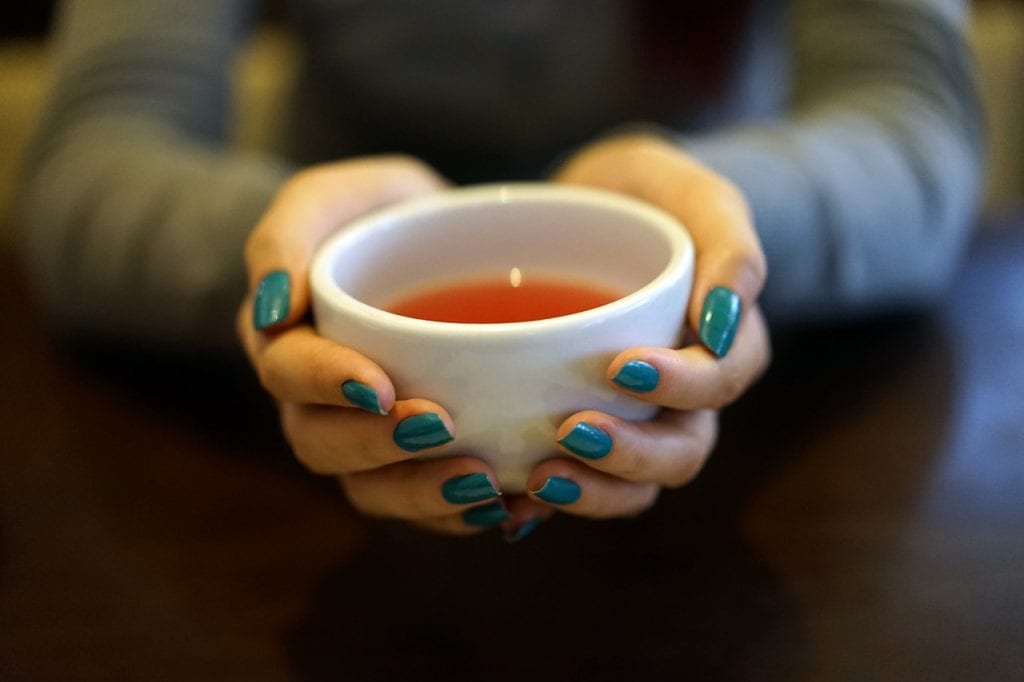
Another reason to drink this tea drink is that it helps boost the immune system. It contains anti-inflammatory properties and antibacterial properties that can ward off illnesses like the common cold and influenza. It also has vitamins and minerals that can help boost your immune system and keep you healthy and safe.
Reduces Inflammation
This sweet-smelling tea helps reduce inflammation as well. Drinking a cup of this lovely tea provides relief from temporary aches and pains, as well as joint pain and arthritis.
Weight Loss Aid
Drinking this fragrant tea has also been associated with weight loss. This tea can aid weight loss by speeding up your metabolism. If you have a faster metabolism, it means your body can process nutrients more quickly and will burn more calories at rest and during activity. Aside from that, jasmine tea also helps soothe stomach troubles. Keep in mind that this benefit is linked to the green tea leaves, the most common base for jasmine tea, rather than the jasmine flowers.
Lower Risk of Heart Disease
Another benefit of drinking this perfumed tea is that it reduces the risk of heart attack and stroke. This aromatic tea is high in polyphenols, which may prevent LDL, the “bad” cholesterol, from oxidizing. Oxidized LDL is potentially harmful as it can raise the risk of developing heart diseases. It’s a good thing that green tea can actually lower bad cholesterol levels found in your body.
READ ALSO: 35 Healthy Recipes For A Low Cholesterol Diet
Supports Good Oral Health
Green tea, the most commonly used tea base for jasmine, contains compounds called catechins. These can protect against tooth decay by eliminating plaque-forming bacteria. Moreover, this scented beverage can also prevent bad breath by reducing odor-causing bacteria.
Good For Skin Health
This nutritious scented drink can also promote skin health and support healthy aging. Micronutrients called polyphenols, which are present in the tea base, act as antioxidants and help keep your skin smooth and looking good. Aside from supporting your skin’s natural ability to heal, components of jasmine flowers have cleansing properties too. In fact, some even say that this fragrant beverage might be the perfect addition to homemade skincare products. So whether you drink it or scrub it onto your skin, it can be good for your health.
Good for Diabetics
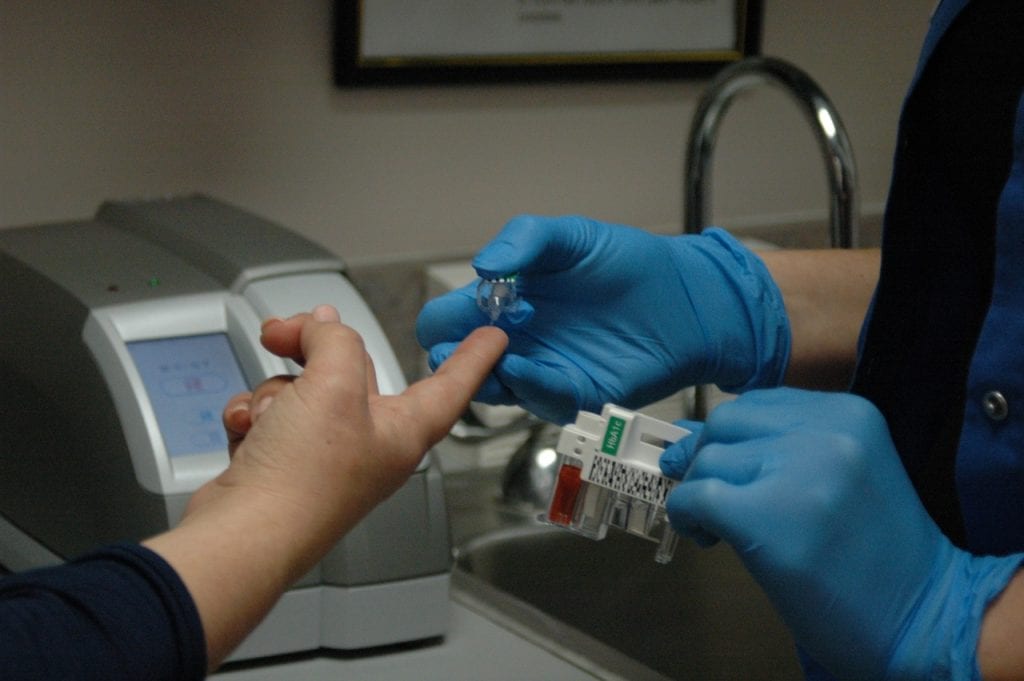
This tea has been a very useful tool in the fight against diabetes. Drinking flower-scented tea can help prevent diabetes by regulating insulin levels. That’s because jasmine green tea contains antioxidants that can help produce insulin and help move sugar in blood cells more effectively.
Helps Prevent Alzheimer’s and Parkinson’s Disease
Another benefit of drinking this tea is that it may help prevent Alzheimer’s and Parkinson’s disease. The polyphenol micronutrients found in this beverage may lower the risk of the said brain disorders. Specifically, jasmine green tea has high contents of the antioxidant EGCG, which may suppress inflammation and brain cell damage. These are the two main factors related to the progression of brain disorders like Alzheimer’s and Parkinson’s disease.
Types of Healthy Jasmine Tea Base
Green Tea
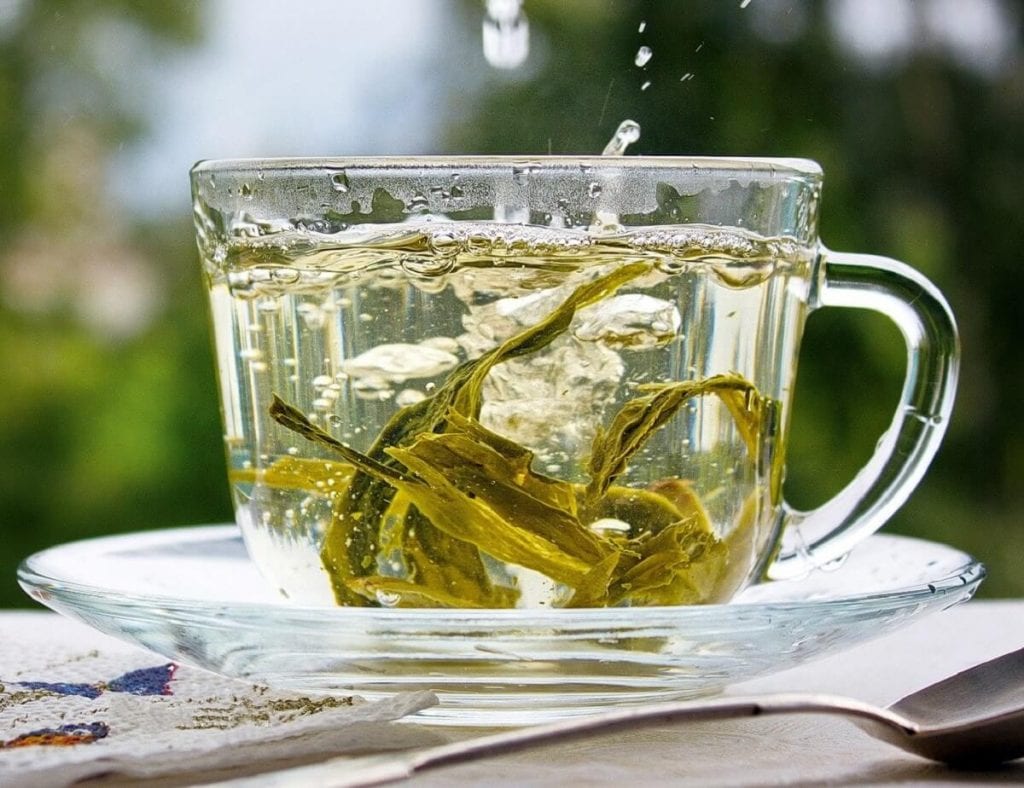
The most common base for this sweetly perfumed tea is green tea. It blends perfectly with the jasmine scent, resulting in a mildly sweet flavor and distinct fragrance. But some tea makers also use white tea, black tea, and even oolong tea or fermented pu’er tea. This tea blends wonderfully with vegetarian dishes like this Simple Sweet Potatoes Recipe.
Black Tea
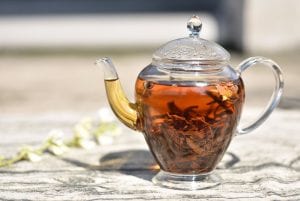
Flickr | Angel Chen
If you prefer a very strong taste, use black tea as the base. Black tea is made by fully oxidising tea leaves, therefore, its flavor is a lot more intense. Combined with the aroma of jasmine flowers, you’ll be delighted with the rich and robust flavor of black jasmine tea. This drink goes well with hearty, robust foods like beef and lamb, as well as spicy dishes.
Oolong Tea
Use oolong tea if you like to add hints of grassiness and a lingering floral flavor to your tea. Oolong jasmine tea has a mild flavor compared to black jasmine tea. This type of tea, however, is not common in western markets.
White Tea
Meanwhile, the serene and aromatic infusion of white tea blends perfectly with the scent of jasmine petals. If you enjoy teas with subtle flavors, white jasmine tea is the ideal type of tea for you. White jasmine tea is best paired with very light foods, like salmon fillets in a simple sorrel sauce, as well as desserts.
Does Jasmine Tea Have Caffeine?
Green tea is the most common base for this fragrant drink. And if you’ll find one thing in green tea that’s not in herbal tea, it’s caffeine. Green tea has caffeine, while herbal teas are caffeine-free. In fact, green teas are widely known as a good source of caffeine, just like coffee.
Moreover, the caffeine content of this flowery tea depends on which type of true tea is used as the base. If infused with black tea leaves, it has higher caffeine content. But if you want a moderate amount of caffeine, use green tea as the base tea. Meanwhile, jasmine teas infused with white tea leaves have the lowest caffeine content.
So if you want to swap coffee for another caffeinated drink, this scented tea is the perfect alternative to keep you awake and focused. But remember to consider the base you’ll be infusing with the jasmine to gauge the caffeine level in your tea.
What Does Jasmine Tea Taste Like?
Generally, jasmine tea has an exquisite flavor with a hint of floral taste and a sweet-smelling finish. But the taste and appearance of this perfumed tea may differ depending on many factors, including what tea base is used and where the jasmine tea plants were grown. The preparation and scenting process may also affect its taste.
How Jasmine Tea is Scented
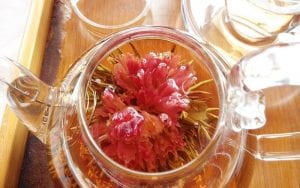
This flowery tea may be scented by blending fresh jasmine flowers directly with tea leaves to infuse them with the fragrance and flavor of the delicate flower. The jasmine petals will then be sifted out from the tea before the tea is dried and packaged. Most of the time, the scenting process is done several times. This method may be cheaper but it also results in a scented floral tea.
To heighten the essence of jasmine and to give this drink an exquisite aroma and flavor, replace the old jasmine blossoms with new, fresh ones.
How to Make Jasmine Tea?
Making this aromatic tea requires effort and patience. And there are quite a few things that you should consider when prepping a cup of jasmine tea.
When making this tea, pick the right type that suits your taste. Also, you should keep in mind that those that are purer and are of high quality are more expensive. Meanwhile, low-grade tea quality can result in bitter brews.
The brewing process starts with the infusion of tea leaves with jasmine flowers. Fused together and they make an exquisite drink. You can also brew infusions using loose tea leaves, tea bags, or pearls. Moreover, each variety of this tea has different flavor profiles, brewing temperatures, and steeping time instructions.
Hot Jasmine Tea
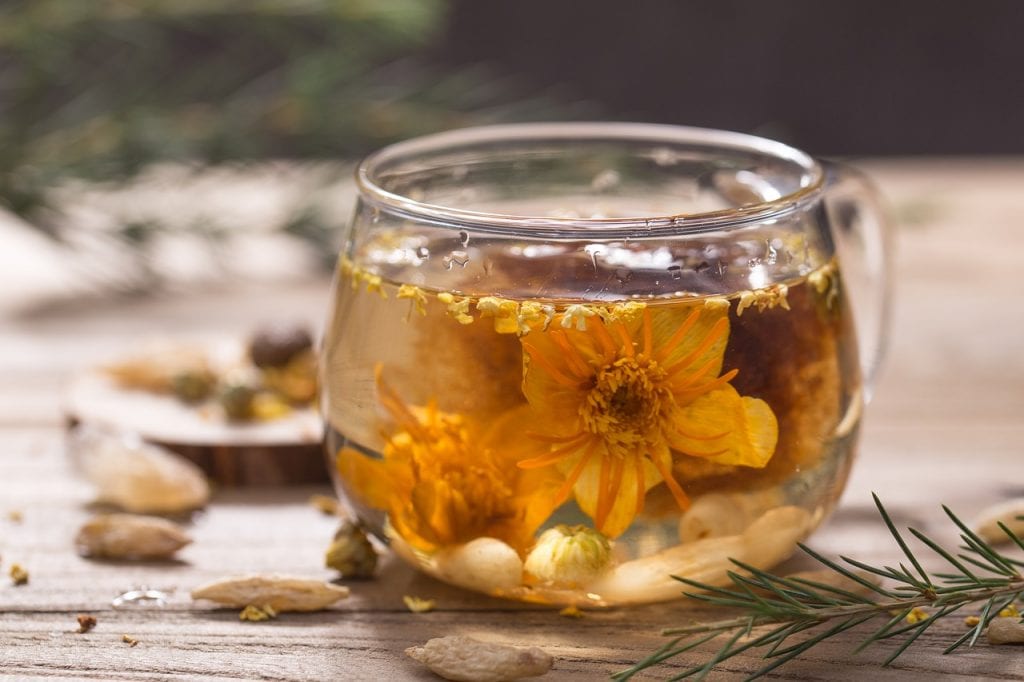
While you can enjoy this drink in a number of ways, nothing beats the simple, aromatic sweetness of a sweet steaming cup of jasmine tea. Make a nice brew of this scented tea with our jasmine tea recipe. You’ll only be needing a handful of ingredients. We assure you, it’s easy to follow and you’re sure to love its sweet, soothing flavor. Its floral flavor matches perfectly with a deliciously deep, dark chocolate cake.
Typically, this fragrant tea is steeped with filtered water simmered at around 190 F for about three minutes. However, the steeping time varies depending on how the tea was processed.
- Remember that the water should be simmering and not boiling to avoid strong, bitter-tasting brew. If you don’t have an electric kettle, just allow your boiling water to rest for one minute before pouring it over your jasmine tea leaves.
If the tea package has specific instructions for steeping, follow them, but about one teaspoon per cup of loose-leaf jasmine tea is a safe bet. Make use of a different jasmine tea if your tea has a strong aftertaste, then lower the steeping temperature or try shortening the steeping time. But if your tea is aromatic and has a subtle perfumed aftertaste, then it’s good for serving!
Jasmine Bubble Milk Tea
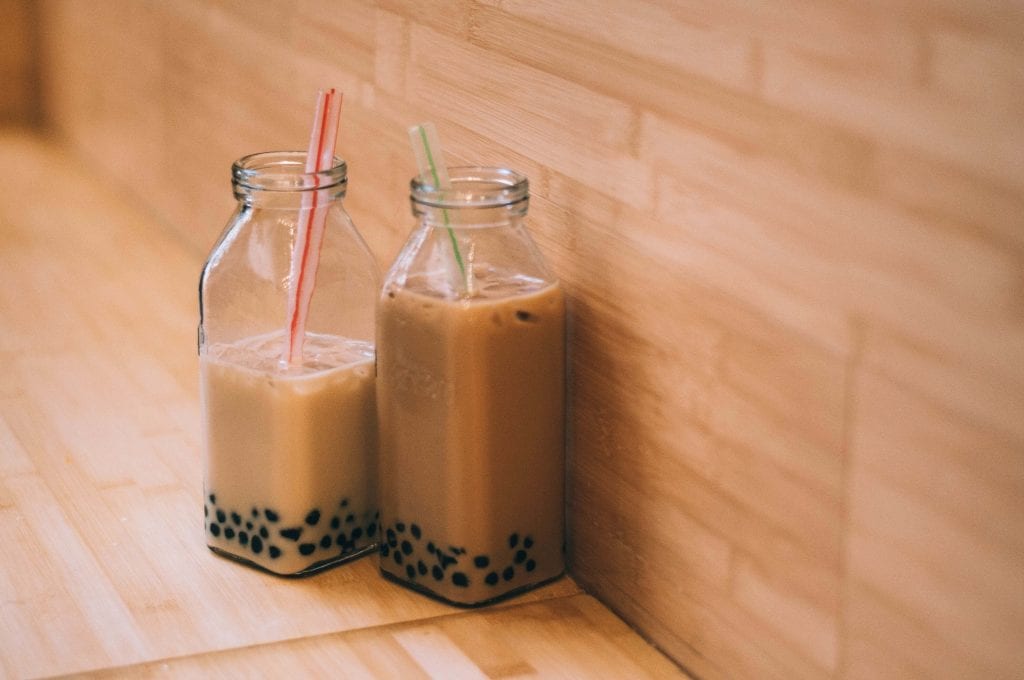
Making your own jasmine milk tea is quite easy. Plus, it’s customizable! Add in pearls or boba then make the tea with a blend of sweetener and milk. If you want to give this cold, sweet drink a try, then check out our easy jasmine milk tea recipe. Happy sipping!
Potential Risks of Jasmine Tea
This scented beverage is incredibly healthy for you. However, it is best to drink in moderation as consuming large quantities of this tea may pose possible risks. Here are three dangers of excessively drinking this flowery beverage:
Insomnia
This scented tea contains caffeine, which can cause sleep difficulty if consumed in large amounts. So if you want to sleep soundly at night, it’s best to drink this sweet tea early in the morning. Also, use green tea as the base to avoid insomnia since black tea has higher caffeine content.
Nervousness
This perfumed beverage tea helps reduce stress as much as it can also cause one. Why? Because of its caffeine content. The caffeine content in green tea causes anxiety and restlessness. Moreover, caffeine can affect the heart, causing the heartbeat to become fast or irregular.
Stomach Discomfort
While this tea increases metabolism rate, it is also advisable to avoid consuming it on an empty stomach. That’s because it is acidic and may cause stomach pains.
Is Jasmine Tea Safe During Pregnancy?
This aromatic tea is safe in pregnancy if consumption is limited. As mentioned above, this perfumed drink and most tea bases contain caffeine which may cause issues for some people.
It’s not advisable to consume caffeine while pregnant as it can lead to complications during pregnancy such as increased chances of miscarriage or stillbirth, problems with the baby’s weight, and more.
Pregnant women are also at risk of iron deficiency. And jasmine tea contains catechins, a type of compound found in teas, which could reduce the body’s ability to absorb iron from foods.
To be on the safer side, pregnant women should drink jasmine tea in moderation. Or you could opt for an equally soothing alternative to jasmine tea like our ginger tea recipe. It’s a great drink for soothing an upset stomach and easing pregnancy-related nausea.
Jasmine tea is a Wonderfully Scented Tea Boasting Many Health Benefits.
These health benefits come from the combination of fragrant jasmine flowers, green tea, and other true teas as its base. Hot or cold, it makes a delightful drink that’ll help you make it through the day. So, brew a cup of this aromatic tea because you’re sure to love its flowery flavors.
